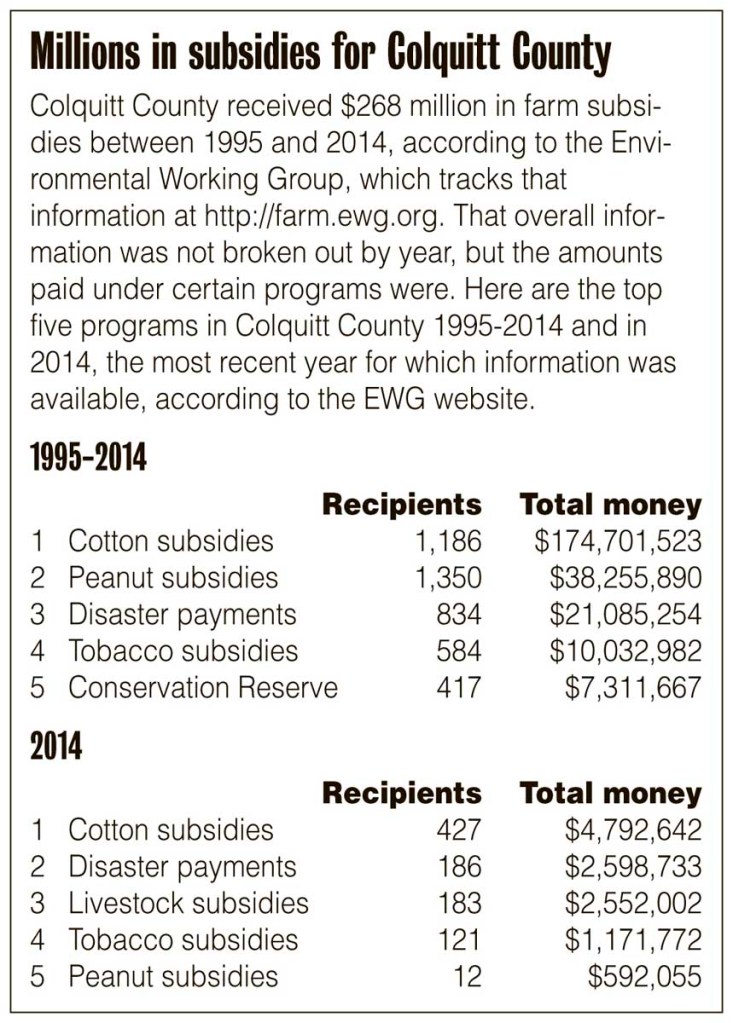Trump targets farm subsidies in budget cuts
Published 8:41 pm Wednesday, May 24, 2017

- Subsidies in Colquitt County
WASHINGTON — In proposing to slash domestic spending, President Donald Trump is taking aim at the $8 billion subsidy program that insures farmers against crop losses.
Farm groups immediately said they’d fight Trump’s budget proposal to limit the amount of assistance farmers can get for crop insurance and to bar grants to wealthy farmers.
The American Farm Bureau said in a statement the subsidies provide farmers a safety net should something happen to their crops. “Clearly,” it said, “this budget fails agriculture and rural America.”
The group’s chief economist, Bob Young, said the subsidies provide “protection if you had a big loss from a drought or if a hail storm comes through.”
The farm subsidies have long come under attack from conservatives and budget hard-liners who criticize the multibillion dollar annual cost.
Trump proposed capping the subsidy at $40,000 per farmer. Buying insurance is such an established part of farm business practices, his budget said, that giving more “generous subsidies (is) arguably no longer necessary.
He also proposed eliminating entirely subsidies to farmers making more than $500,000-a-year.
“It is hard to justify providing assistance to farmers with incomes over half a million dollars,” the budget narrative said. “Doing so undermines the credibility and the purpose of farm programs.”
The proposal said the changes would save $29 billion over the next decade, money Trump says he needs to meet his goals of additional national security spending and also balance the federal budget by fiscal 2028.
The reductions are part of about $46 billion in U.S. Agriculture Department cuts Trump is seeking over the next 10 years, including $192 million from food stamps.
Taxpayers for Common Sense, the government waste watchdog group, applauded the curtailment of farm subsidies. It called the cap and income test “common sense changes to right-size the taxpayer subsidized safety net for agricultural businesses.”
The conservative Heritage Foundation has also long criticized farm subsidies because of their cost, saying the government doesn’t provide similar guarantees to other industries to prevent losses.
But the Farm Bureau said the changes would “gut one of the nation’s most important farm safety net programs at a time when farms are struggling.”
A Congressional Research Service study, for instance, said net farm income is expected to drop by 9 percent this year, the fourth straight year of decline, because of lower commodity prices.
Michigan Sen. Debbie Stabenow, ranking Democrat on the Senate Agriculture Committee, said reduced subsidies “would leave our farmers, families and rural communities vulnerable in tough times.”
Sen. Bob Casey, D-Pa., also a member of the Agriculture Committee, said he will oppose the cuts because they come at a time “when the farm economy and rural communities across the country as struggling.”
The Republican chairmen of the Senate and House Agriculture Committees — Sen. Pat Roberts of Kansas and Rep. Michael Conaway of Texas — also vowed to “fight to ensure farmers have a strong safety net so this key segment of our economy can weather current hard times and continue to provide all Americans with safe, affordable food.”
Another Republican on the committee, Iowa Sen. Joni Ernst, likewise raised “serious concerns.” She said in a statement it’s important “farmers and ranchers struggling with low commodity prices have a viable safety net.”



